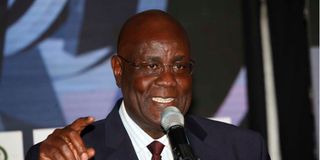High Court bars Justice Aggrey Muchelule's arrest

Justice Aggrey Muchelule durign a function at Supreme Court on November 19, 2015.
What you need to know:
- The temporary order will remain in force pending hearing and determination of Justice Muchelule's case or until further the court issues further orders.
The High Court has stopped the police from arresting, prosecuting or further investigating Justice Aggrey Muchelule in connection to a search conducted in his office on Thursday afternoon by crime detectives.
In the order issued Friday, Justice Jairus Ngaah barred the State from taking any action or decision to investigate, summon, arrest or charge Judge Muchelule on anything connected to the search.
Justice Ngaah also granted his embattled colleague authority to apply for prohibition orders against the State.
The temporary order will remain in force pending hearing and determination of Justice Muchelule's case or until further the court issues further orders.
In the application, Judge Muchelule listed the Office of Director of Public Prosecutions, Inspector General of Police and the Directorate of Criminal Investigations (DCI) as the respondents.
"It is the applicant's (Muchelule) case that the respondents' actions are arbitrary and at any rate, contrary to the Constitution. He fears that going by the respondents' unruly conduct, he is likely to be arrested or arraigned on trumped up charges," Justice Ngaah said in his ruling.
Muchelule’s arguments
In his affidavit, Justice Muchelule said police officers stormed his chambers ostensibly to carry out a search for an unknown amount of money that he is alleged to have received in suspicious circumstances.
The court heard that the search did not yield any recovery of money both in the chambers and on his person.
Judge Muchelule attached an inventory to affirm that “nothing was recovered after conducting search on every corner of the office/chambers”.
The inventory indicates the search was conducted in presence of four police officers - Chief Inspector Marubu, Chief Inspector Karisa, Sergeant Mwangi and Administration police constable Phillip Orego. Others present were Mr Kuria Obadiah and Justice Muchelule.
After certifying the case as urgent, Justice Ngaah directed Justice Muchelule to furnish the respondents with copies of the court papers within seven days so that they can file their responses.
The case will be heard on September 28, 2021.
Lawyer Cliff Ombeta (centre) and Danstan omari (right) speak to journalists at the Milimani Law Courts on July 23, 2021.
KMJA's battle
The Kenya Magistrates and Judges Association has also sued the DPP and the DCI over the arrest of the two judges.
In a petition filed at the High Court on Friday, KJMA sought a permanent order barring police from arresting and charging the two judges pending hearing of the petition.
KMJA, through its secretary-general Derrick Kuto, said prosecution of the two judges poses a threat to the independence of the Judiciary.
Mr Kuto, a senior principal magistrate, describes the police officers who stormed the judges' chambers as unknown individuals.
He says in his affidavit that the officers did not have search warrants though they alleged they had information the judges had received bribes and that the money was stored in their chambers.
The association’s lawyers Danstan Omari, Cliff Ombeta and Shadrack Wamboi alleged that the officers claimed the judges had corruptly received Sh5million.
Mr Omari noted that there is neither a complainant nor an OB number from any police station in respect to the graft allegation.
The lawyers claimed the alleged police officers wanted to plant treated money in the chambers of the two judges but did not manage to as the two refused to leave and remained there as police conducted a search.
"Upon conclusion of the search, an inventory was fully signed on what was recovered, disclosing the alleged bribery money was never found in the chambers," says Mr Kuto.
The petition was filed under certificate of urgency.
LSK’s reaction
At the same time, Law Society of Kenya (LSK) president Nelson Havi condemned the arrest of Justices Muchelule and Chitembwe, describing the arrests as an “assault by the Executive aimed at clawing back on gains made on the independence of the Judiciary”.
The LSK demanded an apology from the Executive and the resignation of DCI boss George Kinoti.
"The actions are intended to subjugate and demoralise the two judges individually, and undermine the Judiciary in general. It is time the legal fraternity - the Bench and the Bar - stood up in unison to condemn the actions of the Executive. Judges should never be subjected to interference in the performance of their duties, save through the constitutional channels and just and lawful cause," Mr Havi said.
He observed that the correct forum for handling complaints against judges is the Judicial Service Commission (JSC).
Mr Havi cited a High Court judgment made in August 2018 where it was held that “cases of misconduct with a criminal element committed in the course of official judicial functions, or which are so inextricably connected with the office or status of a judge, shall be referred to the JSC in the first instance”.
"LSK deprecates the conduct of the DCI. The resolve by the Executive to undermine the independence of the Judiciary through targeted castigation and vilification of judges should not be countenanced," said Mr Havi.
Former JSC member Ahmednassir Abdullahi also faulted the DCI for arresting the two judges.
Mr Abdullahi, a senior counsel, said section 3 of the Kenya Bribery Act gives exclusive enforcement authority of all offences under the Act to the Ethics and Anti corruption Commission (EACC).
He explained that the DCI does not have power to investigate a bribery offence and that in arresting the judges, the agency acted in excess of its powers.






